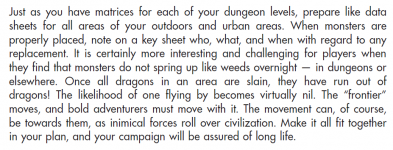By whom?
Not by me. Not by
@hawkeyefan. I think not even by
@EzekielRaiden.
And who has said this?
Not me. Not
@hawkeyefan. I can't recall if
@EzekielRaiden has discussed it.
I am otherwise checked out of the thread as explicitly said previously, because the very people complaining about terminology and insulting descriptions and inappropriately extreme terms/examples are now
using those very things and think it's fine, but no, I didn't say either of these things.
I have said things which could be misinterpreted as the latter in other threads, but haven't spoken of it here. My fundamental issue is that black-box DMing + near-absolute DM authority over the fiction + the expectation of an "auteur" DM creates the perfect storm of
massive incentives to manipulate and near-zero possibility of oversight beyond ineffable vibes, unless the DM just screws up (which, IMO, is guaranteed to happen
eventually to an interfering DM; no deception is ever perfect). That doesn't mean it is guaranteed...but it means that there is a never-ending wellspring of temptation on the DM side, and the consequences almost always drive to extremes (that is, either the DM gets away with it and thus the players can't react negatively, so they get to have their cake and eat it too, or they
don't get away with it, and several very serious negative consequences occur, such as loss of player trust.) In the face of such never-ending temptation, large rewards for doing it, and
theoretically zero consequences for
not doing it, all but the most stalwartly anti-railroad will be tempted to do it at least some of the time. And, at least to me, doing this even once is a serious breach of trust, whether or not I find out. I would make analogies, but I know for an absolute fact that no analogy I could use would land without people getting
extremely upset about the characterization, so I'm just...not going to.
My issue with the former was not "someone who can't be persuaded is a guarantee it's a railroad" but rather that the specific example given. That is, a person who can't be convinced to do a specific task because they have a completely ridiculous religious "belief" ("if I drink any alcohol, I
and my whole family will suffer eternal damnation"), and thus no effort, no matter what, could ever even potentially convince them.
I certainly recognize that there are some acts which a person might never be persuaded to do. I mean, see above: "all but the most stalwartly anti-railroad" implies that someone who
is "the most stalwart" would not be tempted, even when there are (theoretically) no consequences and only benefits. But when folks invent "explanations" based on black-box DMing that are so patently ridiculous that I wouldn't even expect Sam Harris or Richard Dawkins, notorious anti-theists, to attribute such a stupid attitude to a religious person...yeah, that's a bridge too far.
A patently ridiculous "explanation" based on what the DM "already knows" tells me that this DM "already knows" exactly where the events are going, and we're just figuring out
how we make the DM's intended direction happen. When such patently ridiculous examples are presented
fully seriously from the side
defending "what the DM already knows" and "real-life logic" as a protection against railroading, I cannot take seriously the idea that this shield protects anything at all.




